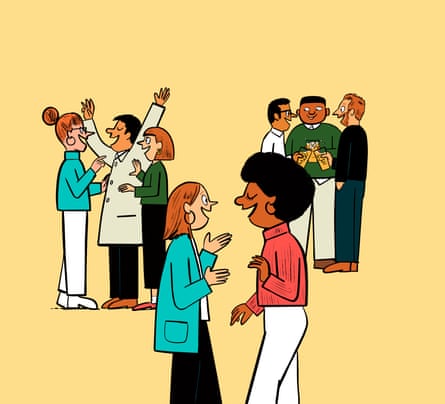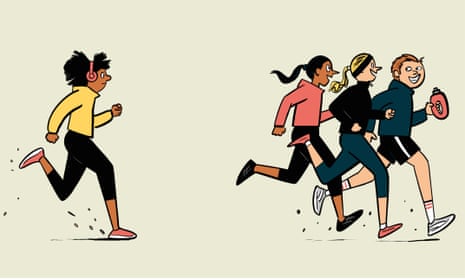When Jeni Matthewman, 44, recently moved back to rural Devon, she imagined she would have plenty of old friends to reconnect with. However, with a busy schedule as a breath and body therapist, and a husband whose own job took him elsewhere during the week, something slowly began to dawn on her: she no longer had a social life.
“During the week, apart from my work, I wouldn’t see anyone,” she says. “Most of the friends I used to know had moved away or they had kids so we couldn’t meet up the way we used to.” And Matthewman was not a person to make friends casually: she had suffered from social anxiety for most of her life.
Then one day a new hobby offered a solution. “I was out walking when I had this idea. Wouldn’t it be great to start a tarot group at my house, like a book group? I can’t over-emphasise what a big leap this was to contemplate inviting strangers into my home. I’ve never even had a birthday party.”
A Facebook advert attracted an unexpected flurry of interest. “At our first meeting, we had 12 women around my table. It’s great because we are bonding over something we have a shared interest in. We’re bringing people together of all ages, from different walks of life. And my confidence has grown so much.” There is now a buzzing WhatsApp group, a waiting list and plans for a second group.
Not everyone has such a lucky escape. Obviously the pandemic forced us to spend more time at home and reprioritise with whom we mixed. But statistically and anecdotally, it feels as if people’s social landscapes have permanently changed. YouGov’s 2021 Friendship study reported that one in eight Britons, across genders, said they had only one close friend, while 7% had no friends at all, and 51% said they struggled to make new friends.
“There are some weeks when the only person I speak to is the postman – I’m praying Royal Mail don’t go on strike again,” quips one home-working friend, who lives alone. “Sure, I’d love to meet up,” says another friend. “But I must warn you, I haven’t seen anyone or been anywhere really. I won’t have much to say.”
Meanwhile, in the US, the term “friendship recession” entered the lexicon after census data revealed that Americans were spending an ever-decreasing amount of time with friends. The blame cannot solely be put on the pandemic because the decline has been steady since 2014. A decade ago, people spent six and a half hours a week with close friends, but by 2021 that figure had plummeted to just 2hr 45min.
So what’s going on? Have we simply become allergic to other people? Psychologist Marisa G Franco, author of Platonic, believes that many of us are socially adrift without even being aware of it. “The issue we are seeing now is something called ‘learned loneliness’ – people have adjusted to isolation. It’s not that they have gone off socialising, it’s that they have learned to live with an unfulfilled need,” she says. “A recent study from Pew Research showed that 35% of people feel that socialising is less important than it was before the pandemic.”
She says that, when it comes to loneliness, humans are not great at identifying the emotion. “For example, one symptom of loneliness is that you’re in a bad mood for no reason.” This could explain the rise in abusive behaviour towards workers in shops and call centres since the pandemic. “Ironically, loneliness makes us withdraw and perceive other people as threatening. We devalue how important connection is, we choose not to depend on other people, which makes us more lonely. It’s a vicious cycle.”
London-based psychotherapist Charlotte Fox Weber has observed a marked increase in the number of people coming to see her about loneliness and problems with friendships. Some are even seeking “friend therapy” to address issues, a suggestion that people are starting to put a higher value on platonic relationships, realising they can offer things not always available within romantic partnerships.
“Friendship offers shared meaning and perspective, finding threads of continuity over time,” she says. “But unlike romance, with friendship the plot isn’t defined – there’s no predestined progression – which is one of its joys.” However, making friends once the infrastructure of college and first jobs is long gone can be tricky, and it’s a subject that isn’t talked about that much.
“It can take people a while to reveal that they feel lonely or that they wish they had more social connections,” says Weber. “There can be a lot of defensive pride around it, bound up with social status. There’s this weird societal pressure to have lots of friends and that if you don’t then you’re not a good human being.”
The observation that friendship is bound up with virtue was first explored by Aristotle. He identified three distinct types of friendship: friendships of utility (in modern terms, the neighbour who can pick up your kids from school or the woman in your yoga class who you can have coffee with afterwards), friendships of pleasure (those pals who will accompany you on a cheese and wine rampage) and lastly, friendships of virtue, soulmate friends, the ones who will sit with you for hours in A&E and still be making you laugh at the end of it.
If we are seeking to expand our friendship circle, a good starting point might be to stop looking exclusively for the “BFF” ones and start seeking some buddies who like doing the same things as we do. Manchester-based musician Taylor Giacoma signed up for her local parkrun, the running club that meets across Britain every Saturday morning. “I had a couple of friends who were massive fans and I honestly didn’t think I would like it,” she says. “I joined as a fitness thing; I find purely social settings really challenging. To my surprise, I absolutely loved it. You can walk round the course if you want – it’s not about being super-fast.”

Giacoma discovered that there was plenty of time before and after the run to chat with people, and often there’s the opportunity for coffee afterwards. “I realised how much I’d needed that social contact, having become somewhat isolated. Parkrun led to me joining another running group and doing all sorts of events that I never in a million years thought I’d do.”
Some activities are more fruitful for making friends than others, though. Franco suggests being strategic about where you conduct your friendship hunt. “Go for things where there is a lot of interaction – tennis, improv, language classes are all good. What all of these activities do is normalise engaging with strangers. Social permission is assumed.” This explains why the conversations I initiate while in the queue at Aldi don’t really go anywhere – it’s not what other people are doing.
Above all, Franco advises, avoid going to one-off events hoping to instantly make new connections. “A mistake people make is they will go to one networking event or spend the evening at a new bar. But in order to make new friends, we need to capitalise on what psychologists term ‘mere exposure’ – our tendency to like people the more we see them. Choose a couple of groups and activities and commit to doing them for three months.”
She points out that initially, when we interact with someone we don’t know, we naturally feel uncomfortable. “The big problem is assuming that because we feel initial wariness then the connection isn’t there. That’s all part of the process.” Thinking back to the first encounters with my closest friends, I definitely think this is true. I met my best friend on the first day of my first job. She was having a meltdown about someone spilling cough syrup on her desk. “Uh-oh,” I thought, and gave her a wide berth. But the following week she offered to lend penniless me a beautiful dress to wear to the office party. That was more than 30 years ago.
Another good way to meet people is volunteering. “You’re getting out and about, doing something that makes you feel good,” says Cheryl Rickman, author of Navigating Loneliness. “Also, everyone is there for the same purpose, so you already share something that matters to you.”

Holly Tyers decided to volunteer for the Friends of Batley Station, a group founded by the late MP Jo Cox. On the face of it, meeting every Saturday to pick up discarded beer bottles and tidy up the station platform doesn’t sound like an obvious route to transforming your social life. “I moved to the area and didn’t know anyone apart from my housemate,” says Tyers, who runs a seed subscription business, the 15 Minute Gardener. “It was the gardening aspect of it that prompted me to get involved. We keep the station looking nice, and maintain the planters. Talking to other human beings and being outdoors was great. There is a pub right outside the station to which we retire, and in the summer we meet in the evenings as well. It sort of forced me to be sociable. I would never go to a bar on my own to meet people or anything like that. I wouldn’t have met these friends if I hadn’t started going to the group, nor would I have met my lovely partner, who is the best thing that happened to me.”
If we are seeking to expand our friendship circle, we sometimes forget to reach out to the people we already know. “Look at those friendships that, for whatever reason, have gone dormant,” suggests Rickman. “Usually, you were friends for a reason and it’s going to take much less effort and be less daunting than connecting with strangers.”
Rather than trying to recreate the past, Rickman advises scheduling activities that will create new memories together, like a day trip. “If you’re stuck, think back to things you used to enjoy as a teenager, like going to a roller disco. You might organise an outing for friends to try it again. Another good idea is going to a comedy night or movie. Studies have shown that social laughter creates connection.” She is also an advocate of scheduling something regularly with one or more friends so it becomes a ritual. “Maybe the last Sunday of the month you do a brunch or a cycling trip, something that’s on the calendar. Or you could invent a seasonal tradition like a bluebell walk or fish and chips on the beach in summer – things you can look forward to.”
One of the most vexing aspects about making friends in adulthood is that it’s never as effortless as pop culture suggests. Somewhere in my brain, I still feel that everyone apart from me meets up with their gang at a coffee shop like Central Perk or has a Cheers-style local where everyone knows your name.
“The reality is friendship takes hard work and it requires courage,” says Weber. “For many of us, the fact that we find ourselves lacking in friends is circumstantial and not really in our control. It can be about having responsibilities and pressures that mean you simply don’t have much free time. It can also be about life stage or geography. Acknowledging your disappointments in this life area and resolving to do something about it, to be brave, is a good starting point.”
All the experts agree that friendships take maintenance. “If need be, set reminders to check in with your friends. Let them know you care,” says Rickman. “Sometimes I send a card or a voice note; you could make a funny video or send them a care package in the post to let them know you are thinking about them, even if you don’t have time to meet up. Stay connected.”

Comments (…)
Sign in or create your Guardian account to join the discussion